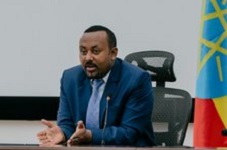Prime Minister Abiy Ahmed said the two telecom operator license the government is set to issue for foreign telecom companies in the coming months does not include mobile money service.
He made the remark on Monday during the consultation meeting with bankers, telecom professionals, and intellectuals on the progress of the liberalization process and partial privatization of the fully state owned Ethiopia Telecom. “Mobile banking is not allowed…We are selling telecom service not banking business,” Prime Minister Abiy said.
“We said our financial sector should remain as it is (closed). We don’t want the (the new telecom) companies to decide what kind of services should be delivered on the telecom pipeline. We decide for what kind of services we can use that pipeline. If we like we can use it (the pipeline) for bank, tourism, transport,” he said.
“We don’t accept such pressure (from international telecom operators). We will not work to kill our banks, which managed to grow in the past 20 years on our shoulders and shoulders of Ethiopian people,” he said.
Meanwhile, he also told representatives of the banks to prepare themselves for future competition. “We don’t wait for you forever to be strong enough for competition. The thing (opening the banking sector for foreign companies) is coming. We don’t want for you (local banks) to sleep and wait,” he said.
“As I understand from some of the comments of individuals in this room, international telecom companies will not come unless the government opens mobile banking,” Abiy said, indicating that such comment shows how the people are networked and closely working to advance the interest of the international telecom companies.
In his comment Abiy also noted that on the other hand, from their experiences some of the participants of the Monday meeting have expressed their concern about the danger to Ethiopian banking system if the government allows the new international telecom operators to engage in mobile money business.
Prime Minister Abiy on the other had stated that after selling its 40% share to foreign telecom operators, Ethio Telecom can start mobile money service in collaboration with the central bank of the country – National Bank of Ethiopia.
In Ethiopia currently, the banking business is fully owned by hundreds of thousands of Ethiopians who on average are making around 30 percent annual profit on average. There are 16 active private banks in the country while a dozen more are being under formation. This includes Islamic banks and banks owned by Ethiopians holding foreign country passports as a result of the new regulation the country introduced this year.
The country has also passed Fintech law that allows startups to be engaged in in innovative financial technology businesses including mobile money services and e-commences.
After first introduced in Kenya for the first time in the world by the telecom company named Safaricom, mobile money has been popular across the world enabling the unbanked rural population of the developing world. It was in March 2007 that Safaricom and Vodafone, which owns 40% share, have introduced M-Pesa – the first mobile money service in the world.
Leaking government information on telecom liberalization process
Commenting on the process of selecting awarding two new telecom license for international operators, Abiy expressed his concern on the transparency of the process. He indicated that some companies are already opening offices and recruiting staff being confident that they will be selected before the government start the bidding process.
He noted that inside government information in relation to the process has been leaking and his administration is worried about the process and needs to get more feedbacks and consultations with various stakeholders this whole month of September.
“After we complete couple of consultations with different stakeholder in Ethiopia. We will also consult with the interested foreigners / companies. September will be the time for consultations,” Prime Minister said.

